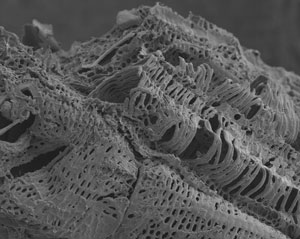 Purdue University researchers are opening the pores of corn to try and increase ethanol yield.
Purdue University researchers are opening the pores of corn to try and increase ethanol yield.
According to a Purdue news release, researchers have discovered that particles from cornstalks undergo previously unknown structural changes when processed to produce ethanol, an insight they said will help establish a viable method for large-scale production of ethanol from plant matter.
Their research demonstrates that pretreating corn plant tissue with hot water – an accepted practice that increases ethanol yields 3 to 4 times – works by exposing minute pores of the plant’s cell walls, thus increasing surface area for additional reactions that help break down the cell wall.
Using high-resolution imaging and chemical analyses, the researchers determined that pretreatment opens reactive areas within the cells of the corn stover that were previously overlooked. In the next step of processing, these enlarged pores are more easily attacked by enzymes that convert cellulose into glucose, which is in turn fermented into ethanol by yeast.

